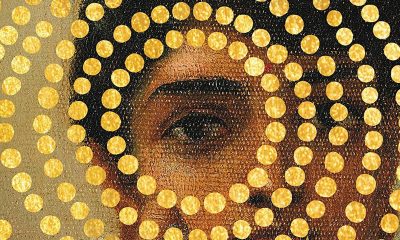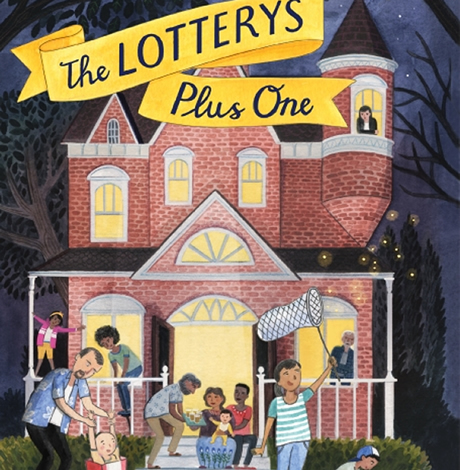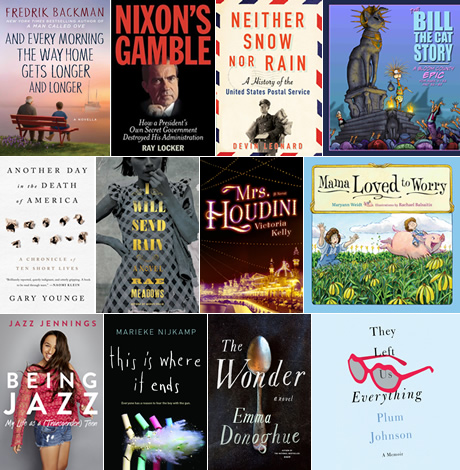Books
YEAR IN REVIEW 2014: Books
Several LGBT-themed tomes among years best
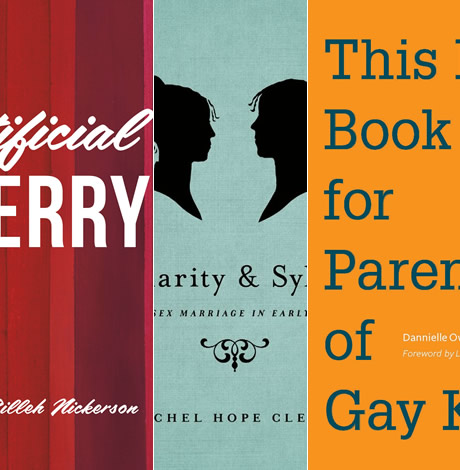
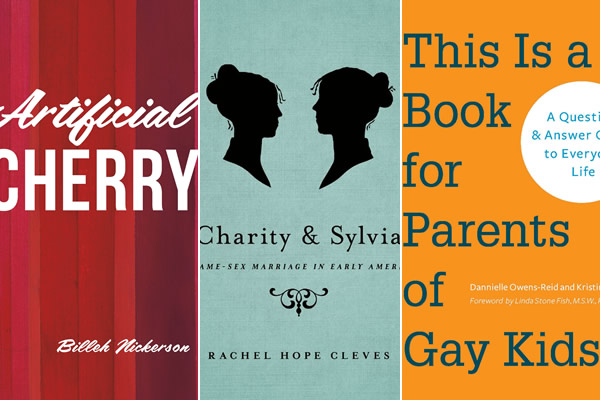
There were several LGBT-themed books published in 2014. (‘Artificial Cherry’ cover courtesy Arsenal Pulp Press; ‘Charity and Sylvia’ cover courtesy Oxford University Press; ‘This is a Book’ cover courtesy Chronicle Books)
So many books, so little time.
It’s easy to feel that way when faced with an entire bookstore full of possibilities. How do you pick? How do you know what’s good?
Start here, with the Bookworm’s “best of 2014.”
Let’s start with fiction:
Throughout the year, every time something bad happens, you’re reminded to hug the ones you love. “Five Days Left” by Julie Lawson Timmer, the story of a woman who is at the end stages of a terminal disease, and a man in another state who has fallen in love with a child he’s fostering, will actually make you want to do that. Bring tissues. That’s all I’m saying.
My list wouldn’t be complete without my annual nod to noted lesbian author Emma Donoghue. Her novel “Frog Music,” a big story of murder and lust set in 1870s San Francisco is a 2014 (or anytime!) must-read. It’s a gauzy tale — in fact, it seems at times like a dream, as though the main character, Blanche Beunon has imagined the whole friendship she had with Jenny Bonnet and the reason for Jenny’s death. Bonus: it’s based loosely on a true event.
I almost guarantee that you won’t see “The Last Time I Died” by Joe Nelms on any other “best of” list. It’s here because it was one of those books that just struck me: Christian Franco, a loser in life and love, learns that he can re-visit his childhood by being brought back from the edge of death. Early trauma left him with holes in his memory. Reviving gave him answers. But he had to die again and again and you won’t be able to put this book down until you know what happens.
They say we all have a doppelganger, and “Recognition” by O.H. Bennett is based on that idea: on a rainy night, as a young widow heads home to pick up her son, she sees a beggar who is her late husband’s double. Many years ago, he went missing and was presumed drowned — but did he? You’ll wonder, too.
I loved “Charity and Sylvia: A Same-Sex Marriage in Early America” by Rachel Hope Cleves, not just for the story of two lives ahead of their time, but for the way Cleves sets the stage for the tale. We get a good sense of what life was like in the late 1700s and early 1800s, not just for lesbians but for every person brave enough to try to settle a new country, and that’s every bit as interesting as the story of two women who did something that early Americans didn’t think was even possible.
And then there are my non-fiction favorites:
“The Baby Boom” by P.J. O’Rourke will bring back memories for anyone born between 1947 and 1964. O’Rourke recalls the usual things that Boomers will remember — playing outside til dark, getting that first color TV — but the real appeal comes when he finds something you’ve long-forgotten, and he expounds upon it. This book is like time-traveling to your childhood.
This seemed to be the year of self-help books and I can’t come up with a better self-help book than “This is a Book for Parents of Gay Kids” by Dannielle Owens-Reid and Kristin Russo, the title of which is delightfully self-explanatory (therefore, easy to remember when you’re in the bookstore). Using a good amount of common-sense and soothing talk, this book has a lot of answers for parents and their kids. And since it sprung from a popular website, you can find more online when you’re done reading.
If you’ve read other “best of” lists this year, you’ve probably found “Being Mortal” by Atul Gawande there — and for good reason. It’s about the end-of-life, aging and how medicine perceives both. Gawande urges readers to take charge of the end of their lives. That’s powerful stuff in a powerful book.
And lastly, another tie: “The Removers” by Andrew Meredith, “Smoke Gets In Your Eyes” by Caitlin Doughty and “The Skeleton Crew” by Deborah Halber all deal with bodies. Dead ones. The Meredith book is a father-son memoir in a coming-of-age way; the Doughty book is a memoir about her years working in a crematory and the Halber book is about how everyday people spend their time comparing missing persons lists with online lists of unclaimed bodies. They’re all so effective, I couldn’t select only one to recommend.
Is it cheating to put a poetry book on this fiction list? I don’t think so — especially when it’s poetry that’s as much fun as that in “Artificial Cherry” by Billeh Nickerson. This book is sassy. It’s silly, but spot-on with its observations and is-it-real-or-not essays in verse.
Books
Embracing the chaos can be part of the fun
‘Make Sure You Die Screaming’ offers many twists and turns

‘Make Sure You Die Screaming’
By Zee Carlstrom
c.2025, Random House
$28/304 pages
Sometimes, you just want to shut the door and forget what’s on the other side.
You could just wipe it from your memory, like it didn’t occur. Or create an alternate universe where bad things never happen to you and where, as in the new novel “Make Sure You Die Screaming” by Zee Carlstrom, you can pretend not to care.

Their mother called them “Holden,” but they’d stopped using that name and they hadn’t decided what to use now. What do you call an alcoholic, queer, pessimistic former ad executive who’s also “The World’s First Honest White Man,” although they no longer identify as a man? It’s a conundrum that they’ll have to figure out soon because a cop’s been following them almost since they left Chicago with Yivi, their psychic new best friend.
Until yesterday, they’d been sleeping on a futon in some lady’s basement, drinking whatever Yivi mixed, and trying not to think about Jenny. They killed Jenny, they’re sure of it. And that’s one reason why it’s prudent to freak out about the cop.
The other reason is that the car they’re driving was stolen from their ex-boyfriend who probably doesn’t know it’s gone yet.
This road trip wasn’t exactly well-planned. Their mother called, saying they were needed in Arkansas to find their father, who’d gone missing so, against their better judgment, they packed as much alcohol as Yivi could find and headed south. Their dad had always been unique, a cruel man, abusive, intractable; he suffered from PTSD, and probably another half-dozen acronyms, the doctors were never sure. They didn’t want to find him, but their mother called…
It was probably for the best; Yivi claimed that a drug dealer was chasing her, and leaving Chicago seemed like a good thing.
They wanted a drink more than anything. Except maybe not more than they wanted to escape thoughts of their old life, of Jenny and her death. And the more miles that passed, the closer they came to the end of the road.
If you think there’s a real possibility that “Make Sure You Die Screaming” might run off the rails a time or three, you’re right. It’s really out there, but not always in a bad way. Reading it, in fact, is like squatting down in a wet, stinky alley just after the trash collector has come: it’s filthy, dank, and profanity-filled. Then again, it’s also absurd and dark and philosophical, highly enjoyable but also satisfying and a little disturbing; Palahniuk-like but less metaphoric.
That’s a stew that works and author Zee Carlstrom stirs it well, with characters who are sardonic and witty while fighting the feeling that they’re unredeemable losers – which they’re not, and that becomes obvious.
You’ll see that all the way to one of the weirdest endings ever.
Readers who can withstand this book’s utter confusion by remembering that chaos is half the point will enjoy taking the road trip inside “Make Sure You Die Screaming.”
Just buckle up tight. Then shut the door, and read.
The Blade may receive commissions from qualifying purchases made via this post.
Books
Two new books on dining out LGBTQ-style
Visit nightclubs, hamburger joints, and a bathhouse that feeds customers

‘What is Queer Food? How We Served a Revolution’
By John Birdsall
c.2025, W.W. Norton
$29.99/304 pages
‘Dining Out: First Dates, Defiant Nights, and Last Call Disco Fries at America’s Gay Restaurants’
By Erik Piepenburg
c.2025, Grand Central
$30/352 pages
You thought a long time about who sits where.
Compatibility is key for a good dinner party, so place cards were the first consideration; you have at least one left-hander on your guest list, and you figured his comfort into your seating chart. You want the conversation to flow, which is music to your ears. And you did a good job but, as you’ll see with these two great books on dining LGBTQ-style, it’s sometimes not who sits where, but whose recipes were used.
When you first pick up “What is Queer Food?” by John Birdsall, you might miss the subtitle: “How We Served a Revolution.” It’s that second part that’s important.

Starting with a basic gay and lesbian history of America, Birdsall shows how influential and (in)famous 20th century queer folk set aside the cruelty and discrimination they received, in order to live their lives. They couldn’t speak about those things, he says, but they “sat down together” and they ate.
That suggested “a queer common purpose,” says Birdsall. “This is how who we are, dahling, This is how we feed our own. This is how we stay alive.”
Readers who love to cook, bake or entertain, collect cookbooks, or use a fork will want this book. Its stories are nicely served, they’re addicting, and they may send you in search of cookbooks you didn’t know existed.
Sometimes, though, you don’t want to be stuck in the kitchen, you want someone else to bring the grub. “Dining Out” by Erik Piepenburg is an often-nostalgic, lively look at LGBTQ-friendly places to grab a meal – both now and in the past.

In his introduction, Piepenburg admits that he’s a journalist, “not a historian or an academic,” which colors this book, but not negatively. Indeed, his journeys to “gay restaurants” – even his generous and wide-ranging definitions of the term – happily influence how he presents his narrative about eateries and other establishments that have fed protesters, nourished budding romances, and offered audacious inclusion.
Here, there are modern tales of drag lunches and lesbian-friendly automats that offered “cheap food” nearly a century ago. You’ll visit nightclubs, hamburger joints, and a bathhouse that feeds customers on holidays. Stepping back, you’ll read about AIDS activism at gay-friendly establishments, and mostly gay neighborhood watering holes. Go underground at a basement bar; keep tripping and meet proprietors, managers, customers and performers. Then take a peek into the future, as Piepenburg sees it.
The locales profiled in “Dining Out” may surprise you because of where they can be found; some of the hot-spots practically beg for a road trip.
After reading this book, you’ll feel welcome at any of them.
If these books don’t shed enough light on queer food, then head to your favorite bookstore or library and ask for help finding more. The booksellers and librarians there will put cookbooks and history books directly in your hands, and they’ll help you find more on the history and culture of the food you eat. Grab them and you’ll agree, they’re pretty tasty reads.
The Blade may receive commissions from qualifying purchases made via this post.

You’re going to be on your feet a lot this month.
Marching in parades, dancing in the streets, standing up for people in your community. But you’re also likely to have some time to rest and reflect – and with these great new books, to read.
First, dip into a biography with “Marsha: The Joy and Defiance of Marsha P. Johnson” by Tourmaline (Tiny Rep Books, $30), a nice look at an icon who, rumor has it, threw the brick that started a revolution. It’s a lively tale about Marsha P. Johnson, her life, her activism before Stonewall and afterward. Reading this interesting and highly researched history is a great way to spend some time during Pride month.
For the reader who can’t live without music, try “The Dad Rock That Made Me a Woman” by Niko Stratis (University of Texas Press, $27.95), the story of being trans, searching for your place in the world, and finding it in a certain comfortable genre of music. Also look for “The Lonely Veteran’s Guide to Companionship” by Bronson Lemer (University of Wisconsin Press, $19.95), a collection of essays that make up a memoir of this and that, of being queer, basic training, teaching overseas, influential books, and life.
If you still have room for one more memoir, try “Walk Like a Girl” by Prabal Gurung (Viking, $32.00). It’s the story of one queer boy’s childhood in India and Nepal, and the intolerance he experienced as a child, which caused him to dream of New York and the life he imagined there. As you can imagine, dreams and reality collided but nonetheless, Gurung stayed, persevered, and eventually became an award-winning fashion designer, highly sought by fashion icons and lovers of haute couture. This is an inspiring tale that you shouldn’t miss.
No Pride celebration is complete without a history book or two.
In “Trans History: From Ancient Times to the Present Day” by Alex L. Combs & Andrew Eakett ($24.99, Candlewick Press), you’ll see that being trans is something that’s as old as humanity. One nice part about this book: it’s in graphic novel form, so it’s lighter to read but still informative. Lastly, try “So Many Stars: An Oral History of Trans, Nonbinary, Genderqueer, and Two-Spirit People of Color” by Caro De Robertis (Algonquin Books of Chapel Hill. $32.00) a collection of thoughts, observations, and truths from over a dozen people who share their stories. As an “oral history,” you’ll be glad to know that each page is full of mini-segments you can dip into anywhere, read from cover to cover, double-back and read again. It’s that kind of book.
And if these six books aren’t enough, if they don’t quite fit what you crave now, be sure to ask your favorite bookseller or librarian for help. There are literally tens of thousands of books that are perfect for Pride month and beyond. They’ll be able to determine what you’re looking for, and they’ll put it directly in your hands. So stand up. March. And then sit and read.
-

 Federal Government2 days ago
Federal Government2 days agoTreasury Department has a gay secretary but LGBTQ staff are under siege
-

 Virginia2 days ago
Virginia2 days agoDefying trends, new LGBTQ center opens in rural Winchester, Va.
-

 District of Columbia1 day ago
District of Columbia1 day agoGay GOP group hosts Ernst, 3 House members — all of whom oppose Equality Act
-

 Opinions3 days ago
Opinions3 days agoUSAID’s demise: America’s global betrayal of trust with LGBTQ people

